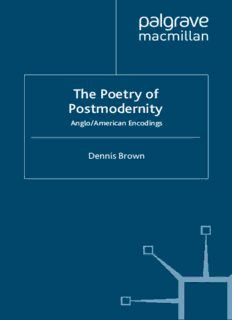
The Poetry of Post Modernity: Anglo/American Encodings PDF
Preview The Poetry of Post Modernity: Anglo/American Encodings
The Poetry of Postmodernity Anglo/American Encodings Dennis Brown THE POETRY OF POSTMODERNITY Also by Dennis Brown INTERTEXTUAL DYNAMICS WITHIN THE LITERARY CROWD - JOYCE, LEWIS, POUND AND ELIOT: The Men of 1914 MS MOFFAT (under the pseudonym Ned Brown) THE MODERNIST SELF IN TWENTIETH-CENTURY ENGLISH LITERATURE: A Study in Self-Fragmentation The Poetry of Postmodernity Anglo/American Encodings Dennis Brown Professor Department of English University of Hertfordshire u St. Martin's Press © Dennis Brown 1994 All rights reserved. No reproduction, copy or transmission of this publication may be made without written permission. No paragraph of this publication may be reproduced, copied or transmitted save with written permission or in accordance with the provisions of the Copyright, Designs and Patents Act 1988, or under the terms of any licence permitting limited copying issued by the Copyright Licensing Agency, 90 Tottenham Court Road, London W1P 9HE. Any person who does any unauthorised act in relation to this publication may be liable to criminal prosecution and civil claims for damages. First published in Great Britain 1994 by THE MACMILLAN PRESS LTD Houndmills, Basingstoke, Hampshire RG21 2XS and London Companies and representatives throughout the world A catalogue record for this book is available from the British Library. ISBN 0-333-60473-3 Printed in Great Britain by Ipswich Book Co Ltd Ipswich, Suffolk First published in the United States of America 1994 by Scholarly and Reference Division, ST. MARTIN'S PRESS, INC., 175 Fifth Avenue, New York, N.Y. 10010 ISBN 0-312-12093-1 Library of Congress Cataloging-in-Publication Data Brown, Dennis, 1940- The poetry of postmodernity : Anglo/American encodings / Dennis Brown. p. cm. Includes index. ISBN 0-312-12093-1 1. English poetry—20th century—History and criticism. 2. American poetry—20th century—History and criticism. 3. Modernism (Literature)—Great Britain. 4. Modernism (Literature)—United States. I. Title. PR478.M6B73 1994 821' .9109—dc20 93-48922 CIP In memory of Elsie Worvill (1916-91) George Macbeth (1932-92), poet Nola Clendinning Pechey (1943-93), artist In the electric age we wear all mankind as our skin Marshall McLuhan Contents Preface ix 1 Introduction 1 2 W. H. Auden's "Hermes" 15 3 Allen Ginsberg's "America" 30 4 Sylvia Plath's "Ariel" 45 5 John Berryman's "Henry" 59 6 Ted Hughes' "Crow" 75 7 Geoffrey Hill's "Mercia" 90 8 John Ashbery's "Wave" 105 9 R. S. Thomas's "Amen" 120 10 Conclusion 134 Index 142 vii This page intentionally left blank Preface This book was written between the winter of 1991-2 and the spring of 1993: the specific time frame seems important in terms of the ongoing postmodernism debate - as we race towards the double millennium. Such a declaration inevitably owns to its temporal partiality and im plies a fairly imminent sell-by date. In Wyndham Lewis's description, we are all "time snobs" now: both the pace of global developments and the instantaneity of communications constantly outflank any attempt to make a fixed map of the contemporary scene. This is, in fact, what makes the discussion of 'postmodernity' continuous, con tingent, confusing - and exciting. In such a situation it seems neces sary to date a particular stage of one's thinking: so I shall 'sign' this as of Easter 1993. I should like here to thank Peter Widdowson for cannily pointing me, nearly three years ago, towards the direction I was going in - without my then knowing it. Thanks, too, to the East London (and FAB) 'Psychoanalysis and the Public Sphere' conferences where two of the chapters below were tried out and whose discussions have helped form my own sense of the nature of postmodernity. Also thanks to the encouragement or advice of Phil Ballard, Eibhlin Evans, Paul Gatland, Patrick Grant, Graham Holderness, Sarah Hutton, Sharon Monteith, Graham Pechey, Jean Radford, Eric Trudgill and George Wotton, and to Zygmunt Bauman whose book Intimations of Postmodernity came out at a crucial stage of my own project and who responded, in detail, to some material I sent him - "in the spirit of dialogue". The writing of this book has coincided with the welcome trans formation of my teaching base from Hatfield Polytechnic to the University of Hertfordshire. With its roots in a gift of land by A. S. Butler of De Havilland, our institution has itself played a role in the construction of postmodern realities - most particularly in aero- engineering, information science, psychology and pharmacological biochemistry: it has been a privilege to serve on research commit tees with representatives of such disciplines. The work below ori ginated in a research project registered with our old Research and Consultancy Committee. IX
Description: